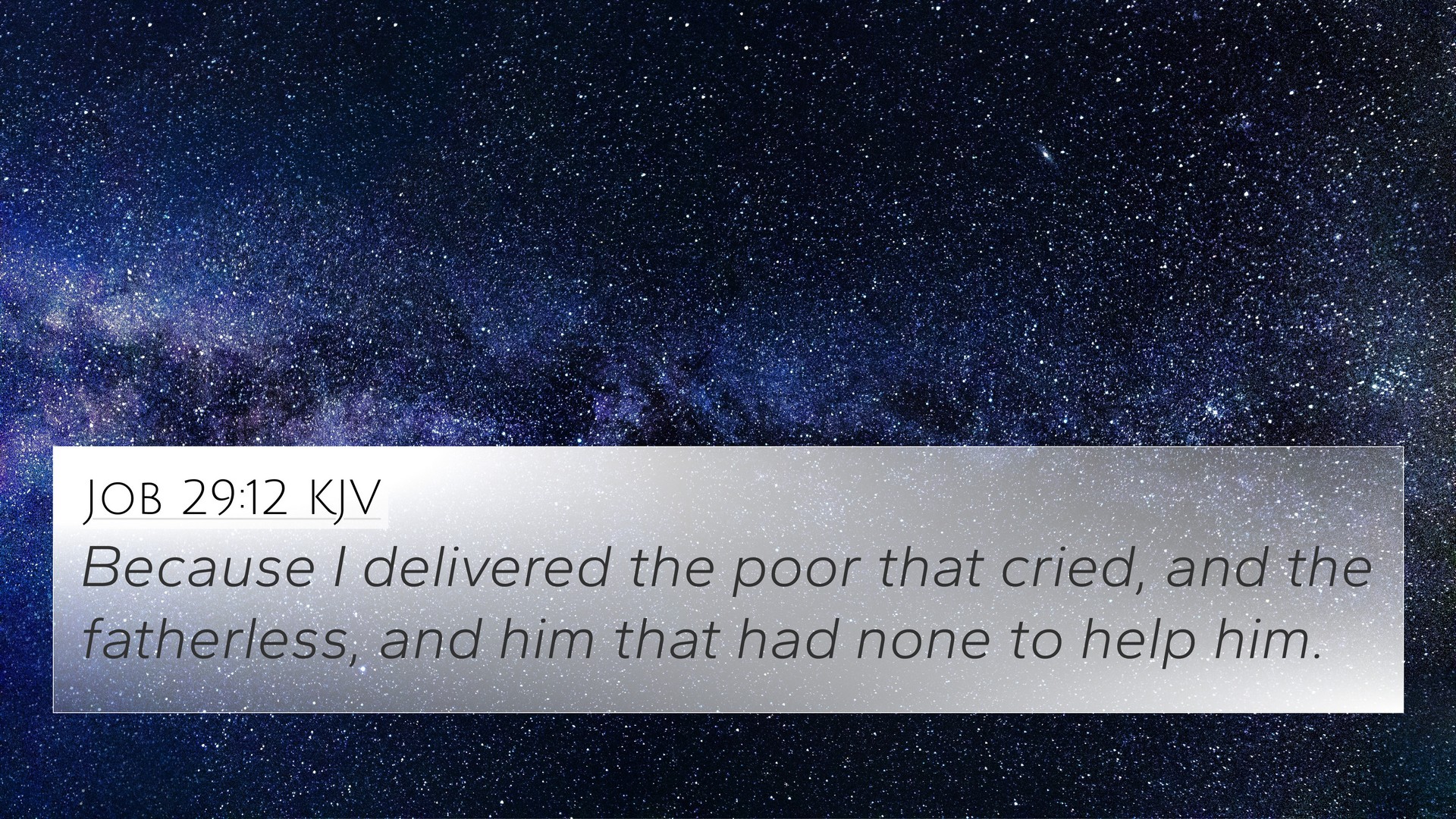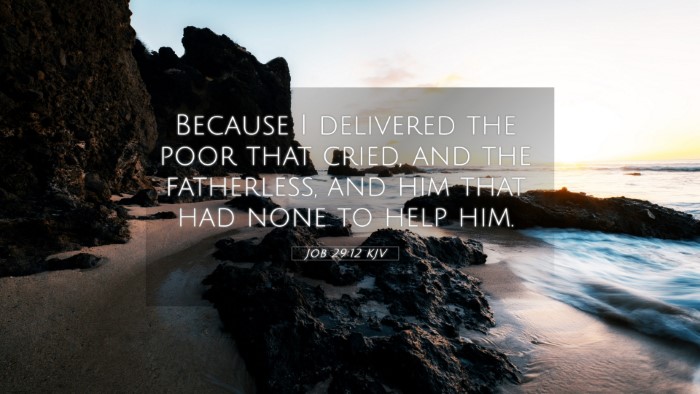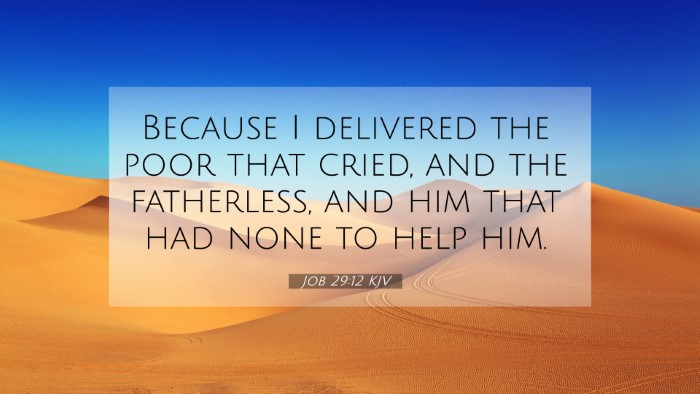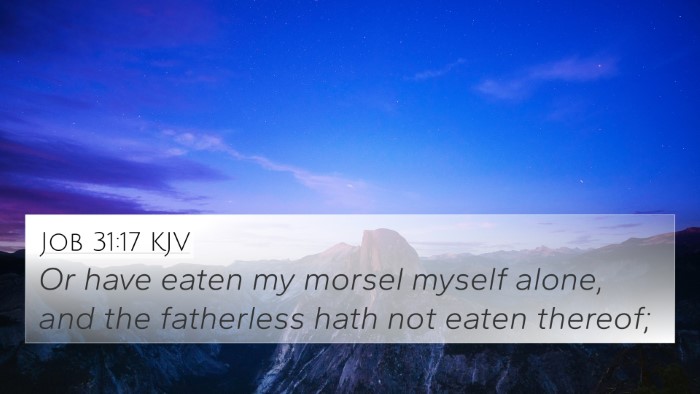Old Testament
Genesis Exodus Leviticus Numbers Deuteronomy Joshua Judges Ruth 1 Samuel 2 Samuel 1 Kings 2 Kings 1 Chronicles 2 Chronicles Ezra Nehemiah Esther Job Psalms Proverbs Ecclesiastes Song of Solomon Isaiah Jeremiah Lamentations Ezekiel Daniel Hosea Joel Amos Obadiah Jonah Micah Nahum Habakkuk Zephaniah Haggai Zechariah MalachiJob 29:12 Similar Verses
Job 29:12 Cross References
Because I delivered the poor that cried, and the fatherless, and him that had none to help him.
Uncover the Rich Themes and Topics of This Bible Verse
Listed below are the Bible themes associated with Job 29:12. We invite you to explore each theme to gain deeper insights into the Scriptures.
Job 29:12 Cross Reference Verses
This section features a detailed cross-reference designed to enrich your understanding of the Scriptures. Below, you will find carefully selected verses that echo the themes and teachings related to Job 29:12 KJV. Click on any image to explore detailed analyses of related Bible verses and uncover deeper theological insights.
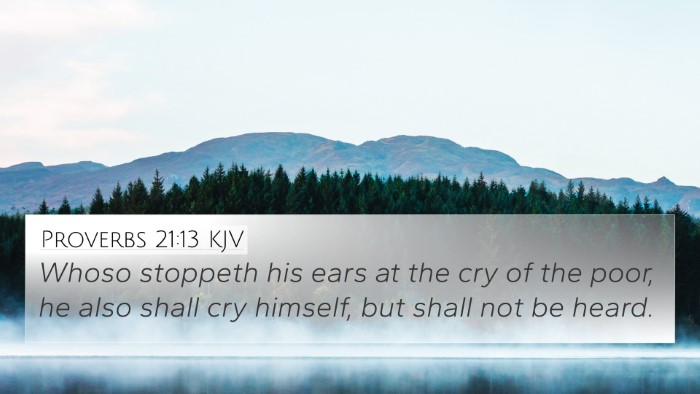
Proverbs 21:13 (KJV) »
Whoso stoppeth his ears at the cry of the poor, he also shall cry himself, but shall not be heard.
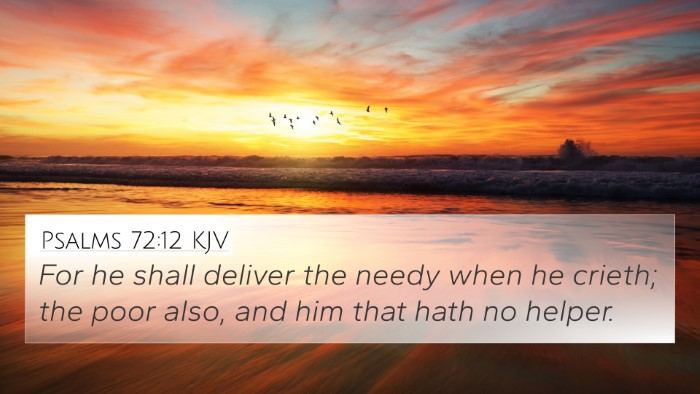
Psalms 72:12 (KJV) »
For he shall deliver the needy when he crieth; the poor also, and him that hath no helper.

Proverbs 24:11 (KJV) »
If thou forbear to deliver them that are drawn unto death, and those that are ready to be slain;
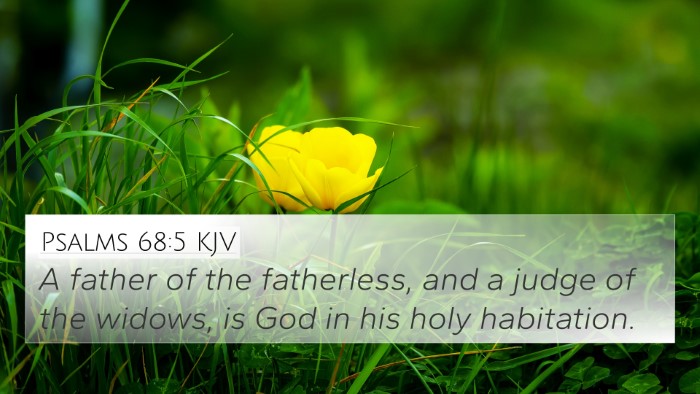
Psalms 68:5 (KJV) »
A father of the fatherless, and a judge of the widows, is God in his holy habitation.
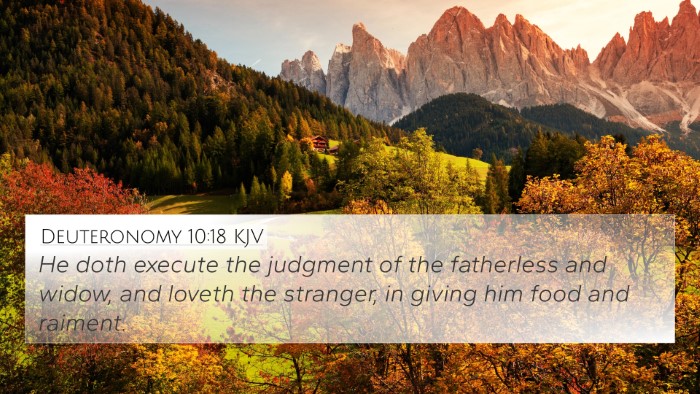
Deuteronomy 10:18 (KJV) »
He doth execute the judgment of the fatherless and widow, and loveth the stranger, in giving him food and raiment.
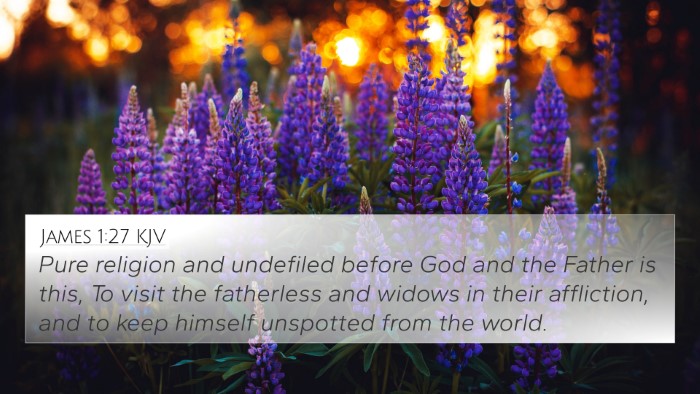
James 1:27 (KJV) »
Pure religion and undefiled before God and the Father is this, To visit the fatherless and widows in their affliction, and to keep himself unspotted from the world.

Job 24:4 (KJV) »
They turn the needy out of the way: the poor of the earth hide themselves together.
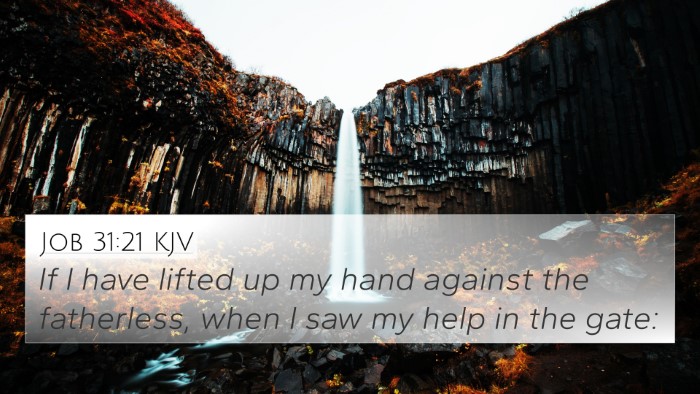
Job 31:21 (KJV) »
If I have lifted up my hand against the fatherless, when I saw my help in the gate:
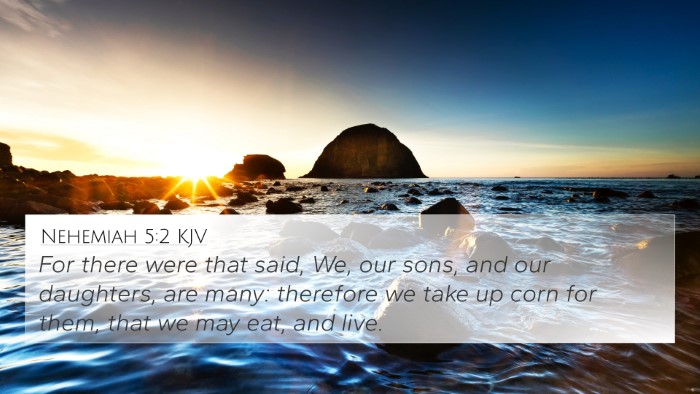
Nehemiah 5:2 (KJV) »
For there were that said, We, our sons, and our daughters, are many: therefore we take up corn for them, that we may eat, and live.
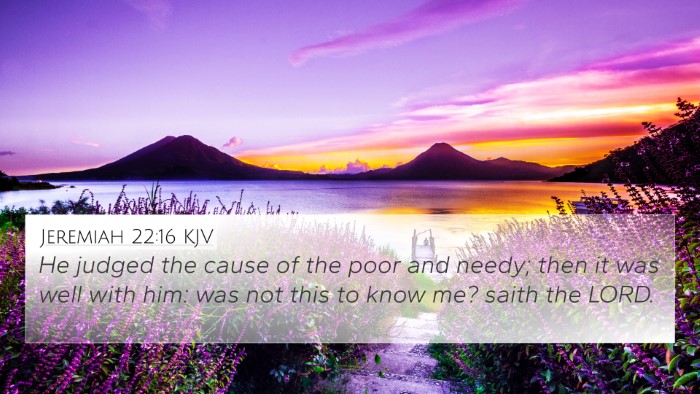
Jeremiah 22:16 (KJV) »
He judged the cause of the poor and needy; then it was well with him: was not this to know me? saith the LORD.
Job 29:12 Verse Analysis and Similar Verses
Understanding Job 29:12
Job 29:12 states, "Because I delivered the poor that cried, and the fatherless, and him that had none to help him." This verse highlights Job's character and his role as a champion for the oppressed and needy. Below is a detailed interpretation and analysis of this verse, combined from several public domain commentaries.
Insights from Public Domain Commentaries
Matthew Henry emphasizes that Job's actions reflect his compassionate nature. He points out that Job was actively involved in assisting those who could not help themselves, illustrating a fundamental principle of righteousness in the biblical context. Job’s commitment to justice and mercy showcases how individuals should respond to the needs of the less fortunate.
Albert Barnes notes that the mention of 'the poor' and 'the fatherless' denotes not just a physical condition but a spiritual one, where the helpless and marginalized often find themselves at the mercy of society. Barnes posits that Job’s reflection upon his past brings to light an essential aspect of true leadership and morality - selfless service towards others, especially in times of distress.
Adam Clarke points out the importance of community responsibility. He asserts that Job took it upon himself to serve others as part of his moral duty. Clarke elaborates on the idea that aiding the helpless is intrinsically linked to one's faith, creating a direct correlation between belief and action. The reference to those 'that cried' draws attention to the urgency and desperation of their needs, urging a call to action for the faithful.
Key Themes and Connections
From Job 29:12, several themes emerge that connect with other biblical texts:
- Compassion for the Needy: This theme is echoed in Bible verse cross-references such as Psalms 82:3 which states, "Defend the poor and fatherless: do justice to the afflicted and needy."
- Personal Responsibility: The idea that we are called to aid those less fortunate is a motif seen in Proverbs 31:8-9, encouraging individuals to speak for those who cannot.
- Social Justice: This idea resonates with Isaiah 1:17 where the Lord instructs, "Learn to do right; seek justice. Defend the oppressed."
- The Righteous as Intercessors: Job’s role mirrors that of other biblical figures like Moses (Exodus 32:11-14) who interceded for the people.
- God's Heart for the Helpless: This principle is echoed in James 1:27, stating, "Religion that God our Father accepts as pure and faultless is this: to look after orphans and widows in their distress."
- Empathy towards the Afflicted: References like Luke 4:18 where Jesus proclaims His mission to help the oppressed highlight this important call.
- Faith in Action: Job's compassion draws parallels with 1 John 3:17, which challenges believers to act upon their faith by providing for those in need.
Cross-Referencing Biblical Texts
The act of cross-referencing in the context of Job 29:12 not only leads to a deeper understanding of the verse but also illustrates the interconnectedness of scriptural teachings:
- Job 31:16-17: Job reflects on his treatment of the needy, reinforcing his moral obligation.
- Matthew 25:35-36: Jesus speaks of serving those in need as serving Him, paralleling Job’s actions.
- Galatians 6:2: This verse encourages believers to bear one another's burdens, echoing Job's life of service.
- Luke 6:38: The principle of giving and receiving highlights the reciprocal nature of kindness.
- Acts 10:4: Cornelius’s acts of charity are noted, aligning with Job's noble endeavors.
- Proverbs 19:17: "He who is kind to the poor lends to the Lord," more deeply embedding Job's character into biblical virtues.
Applying the Insights
In interpreting Job 29:12, it is essential to see it not merely as a historical account but as a timeless call to action for believers. It urges all to embody compassion and righteousness in their daily lives. The understanding derived from the verse provides profound insights into how individuals, regardless of status, can make impactful contributions to society through acts of kindness towards those in need.
Conclusion
Thus, we can see that Job 29:12 is a pivotal verse that encapsulates the values of compassion, social responsibility, and righteous living. By cross-referencing with accompanying scriptures, we gain a fuller picture of what it means to live a life that reflects the heart of God. In seeking out connections between Bible verses, one finds a rich tapestry of encouragement and instruction to act justly and love mercy as exemplified by Job.
